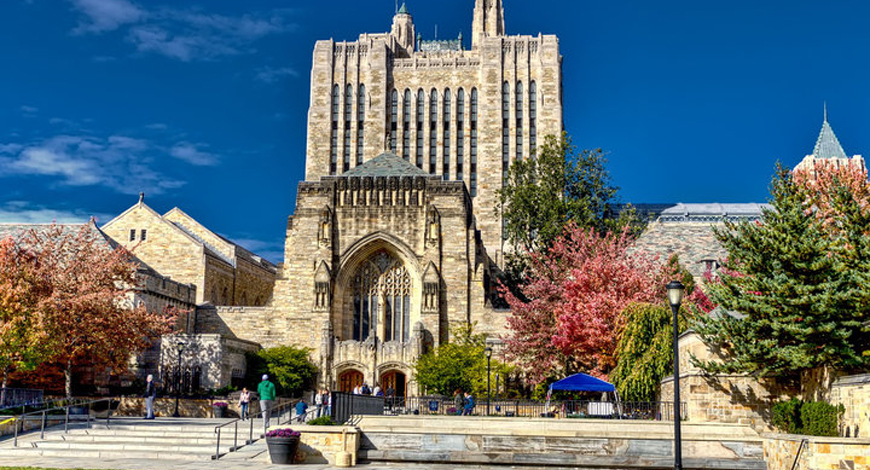常青頌
The annual Yale Commencement is always held on the last Monday of May, which is the Memorial Day. It usually lasts for three days from the preceding Saturday to Monday. All degree candidates一undergraduates, as well as candidates from the Graduate School and the University's professional schools-participate in the ceremony. The ceremony takes place outdoors, rain or shine, on Yale's historic Old Campus, in order to accommodate the more than 10,000 friends and family members who wish to attend.
一年一度的耶魯畢業(yè)典禮總會(huì)在五月的最后一個(gè)星期一如期舉行��,這一天是美國(guó)的"陣亡將士紀(jì)念日"�。通常���,畢業(yè)典禮從之前的那個(gè)周六持續(xù)到周一���,歷時(shí)三天。 所有即將獲得學(xué)位的耶魯學(xué)生�,包括本科生�、研究生院及其他專(zhuān)業(yè)學(xué)院的畢業(yè)生都會(huì)參加這個(gè)盛典��。不論晴雨�,慶典都會(huì)在老校園露天舉行��,以容納前來(lái)參加畢業(yè)典禮的學(xué)生家長(zhǎng)及朋友��,通常有1萬(wàn)多人。
Class Day, which also takes place on Old Campus on the second day of the commencement. It includes the awarding of academic, artistic, and athletic prizes, the celebration of Yale College traditions, and an address by a notable speaker. Class Day lasts approximately two hours.
慶?��;顒?dòng)的第二天稱(chēng)為"畢業(yè)生日",也在老校園舉行��。"畢業(yè)生日"的活動(dòng)包括: 頒發(fā)學(xué)術(shù)�����、藝術(shù)�、運(yùn)動(dòng)獎(jiǎng)項(xiàng)��;耶魯學(xué)院的傳統(tǒng)慶?���;顒?dòng)����;以及一位名人致辭。整個(gè)活動(dòng)將持續(xù)近兩個(gè)小時(shí)�����。

Class Day traditions include a student reflection, a poem, a class history, the planting of the Ivy, and the dedication of class stone. The occasion has both a serious and a celebratory air. Members of the class come together at the end of their college experience to listen to a distinguished speaker charge them for the future, celebrate classmates' distinction, and share memories. The event concludes with the alma mater "Bright College Years" and the waving of white handkerchiefs for the final line of the song.
傳統(tǒng)節(jié)目�,諸如回憶學(xué)生生涯、詩(shī)朗誦�、班級(jí)回顧��、種植常青藤����,以及捐贈(zèng)班級(jí)紀(jì)念石。現(xiàn)場(chǎng)既莊嚴(yán)又不乏喜慶氣氛:在學(xué)生生涯即將結(jié)束的時(shí)候,同屆的校友走到一起��,聆聽(tīng)做演講的同學(xué)對(duì)未來(lái)的憧憬�����,調(diào)侃這一屆學(xué)生的與眾不同�����,分享共同的美好回憶�。最后��,整個(gè)活動(dòng)在校歌"美好的大學(xué)時(shí)光"中接近尾聲��,唱到最后一句時(shí), 同學(xué)們揮舞著白手帕�����,對(duì)美好的大學(xué)生活說(shuō)再見(jiàn)����。
One Class Day tradition is the reading of an original poem describing the connection between the growth of the ivy vine and the flourishing of the graduating class. The poem is called Ivy Ode and composed by a selected graduate. Traditionally, the Ivy Ode had been read in both Latin and English for hundreds of years. As part of a more modem ritual, the Ivy Ode may be translated into a foreign language rather than Latin. For instance, the 2005 Ivy Ode was recited in Spanish, and the 2006 poem in Ancient Irish. The most exciting thing is that the school authority decided the 2007 Ivy Ode to be read in Chinese other than English. It was so great a surprise that 6 of the YC'07 Chinese students volunteered to translate the original English poem into Chinese, which was polished by Taisu Zhang, a 2005 Yale alumni of Timothy Dwight College. It was the first time for an Ivy Ode to be read in Chinese and the poem was so beautifully translated that it has moved many Chinese students, motivating them to apply to Yale:
"畢業(yè)生日"有個(gè)傳統(tǒng),每年都要朗誦一首描寫(xiě)常青藤的成長(zhǎng)與畢業(yè)班的成長(zhǎng)之間關(guān)系的原創(chuàng)詩(shī)歌���。通常是挑選一位優(yōu)秀畢業(yè)生,由他/她創(chuàng)作��,這首詩(shī)歌就叫《常青頌》����。幾百年來(lái),《常青頌》都是用拉丁文和英語(yǔ)朗誦�����;近些年�����,又形成了將其翻譯成另一種外語(yǔ)來(lái)代替拉丁文的慣例。比如��,2005年的《常青頌》采用了西班牙語(yǔ)�,2006年則用古愛(ài)爾蘭語(yǔ)朗誦。最令人興奮的是����,2007年的畢業(yè)典禮上���,校方?jīng)Q定�����,將當(dāng)年的《常青頌》譯成漢語(yǔ)與英語(yǔ)一同朗誦。得知這個(gè)天大的驚喜,2007級(jí)的6名中國(guó)畢業(yè)生主動(dòng)承擔(dān)起將英文原文譯成漢語(yǔ)的任務(wù)�����,并請(qǐng)畢業(yè)于蒂莫希德懷特學(xué)院的2005級(jí)校友張?zhí)K泰完成潤(rùn)飾����。這是耶魯歷史上第一次用中文朗誦《常青頌》。譯文如此優(yōu)美�,打動(dòng)了無(wú)數(shù)中國(guó)學(xué)生����,激勵(lì)他們申請(qǐng)去耶魯讀書(shū):
The gate swings open, and minutes pass/ Someone cracks a joke��、3-the last/ Heard as a student / Four years ago, this stage was far / Now could we get there from where we are / Well, who wouldn't?". The stories of our hands explain/ A common bond that must remain / Though we are gone- / We are the grass, we are the rooms / The silent marching that resumes / Its slow, proud song.
大門(mén)緩緩敞開(kāi),時(shí)光悠悠流逝/學(xué)子彼此的笑語(yǔ)歡聲/即成往事/遙想當(dāng)年�����,這個(gè)舞臺(tái)何其遙遠(yuǎn)/回首間���,誰(shuí)不奢望/時(shí)空倒轉(zhuǎn)�,昨日再現(xiàn)? /……我們的故事����,默默銘記/那共享的情誼��,心中的靈犀/我們雖然離開(kāi)--/但我們是這里的青草,這 里的高塔/是悠揚(yáng)��、驕傲的歌聲里/沉默前行的步伐���。
The tradition of planting the Ivy began in 1852, when the first ivy vine was planted near the wall of what is now Dwight Memorial Chapel.
種植常青藤的傳統(tǒng)始于1852年,第一棵常青藤就種在現(xiàn)在的德懷特紀(jì)念堂墻角��。












